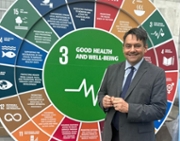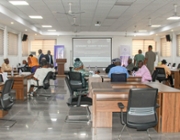LGAZ looking for improved financing for service delivery

30 July 2025
The Local Government Association of Zambia (LGAZ) is stepping up its quest for improved financing to help local government deliver quality services.
Following the Enhancing Local Government Financing Seminar held in Mansa, Luapula Province on 22 May 2025, LGAZ has reaffirmed its commitment to addressing the financing challenges faced by local authorities across Zambia. The seminar, which was supported by the Commonwealth Local Government Forum, with co-funding from the European Commission, provided a number of insights which shaped the focus of the Joint 69th Annual Conference of LGAZ, and 22nd General Assembly of AMICAALL, held at the Lusaka International Convention Centre from 23 to 25 July 2025, with the theme: Innovative Municipal Financing and Service Delivery: Pathways for Sustainable Growth and Inclusive Development.
Strengthening finance systems
A conference background paper outlined strategic pathways for strengthening municipal financing systems and improving service delivery in the face of mounting urban pressures. The paper sets the tone for urgent yet forward-thinking dialogue on how local authorities can become more financially resilient, efficient, and inclusive.
Pressure to deliver
As Zambia’s urban population continues to grow, municipalities are under increasing pressure to deliver essential services, from water and sanitation to solid waste management, roads, and local infrastructure. Traditional financing models, however, have proven inadequate. The conference theme calls for a shift toward innovative approaches that include diversified revenue sources, improved fiscal discipline, and robust accountability mechanisms.
The paper stresses that: municipalities need to evolve into financially viable and accountable entities, pointing to the integration of digital tools, transparent procurement systems, and strengthened public-private partnerships (PPPs) as critical enablers of change.
Decentralisation and devolution
The conference also reflected on Zambia’s fiscal decentralisation journey, recognising progress in the devolution of functions and resources, while acknowledging ongoing challenges in local autonomy, institutional capacity, and access to predictable funding. To address these gaps, there is a need to reform intergovernmental fiscal transfers, as well as legal frameworks to allow councils greater control over local revenue generation and retention, which is in line with the Republican Constitution.
Furthermore, the need for inclusive service delivery models that prioritise equity and citizen engagement cannot be over emphasised. Despite policy commitments, many communities continue to face limited access to clean water, poor road networks, and inefficient waste management systems. Leveraging performance-based grants, accessing climate finance, and applying smart technologies to strengthen infrastructure development and data-driven planning therefore remain key.
Community participation
Recognising that meaningful transformation requires community involvement, the conference focused on advocating for participatory budgeting and stronger citizen engagement in decision-making processes.
LGAZ Executive Director Mpatanji Namumba explained: "This is because LGAZ is convinced that sustainable development is most achievable when residents are active partners in shaping their local environments. We welcome input and partnerships."
Shared vision
In light of the 2025 Conference, LGAZ is calling on policymakers, development partners, local leaders, and civil society to rally behind a shared vision for local government transformation. The conference has presented a timely opportunity to co-create practical, innovative, and inclusive solutions for a stronger and more sustainable local governance system.
Back to News





